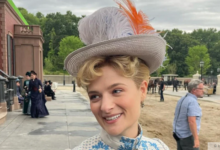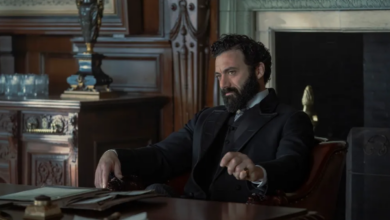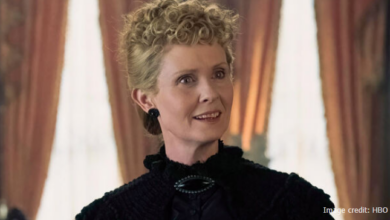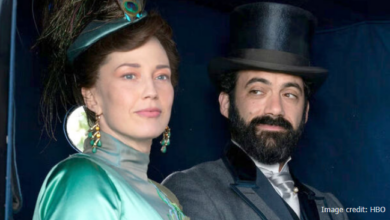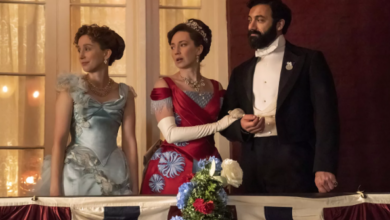Interview: Morgan Spector on the Larger than Life characters of ‘The Gilded Age’
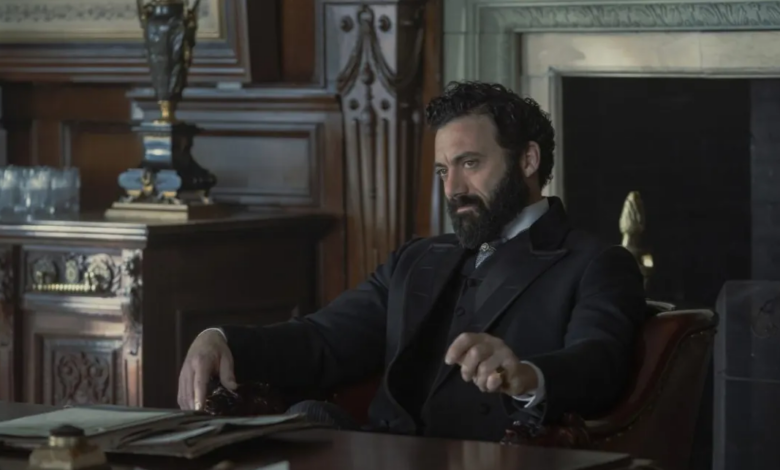
The Gilded Age just finished airing it’s second season a few months ago, and we can’t wait to see where it goes next. The HBO show is about the era in New York City where the old money was rich, and the new money was, well, richer. It’s opulence personified for TV, and the historical drama comes from the creative minds of Julian Fellowes and Sonja Warfield.
Meticulously researched and crafted, it’s a show where it’s easy to slip into the world-building and forget that you’re in the 21st century and not way back in the 1880s. In addition to the writing and all of the crafts that make up the screen, the actors and actresses taking up the mantle of the fictionalized (and not so-fictionalized) people from that era help transport us to a world that’s gilded. One of those actors is Morgan Spector.
Morgan Spector has had a career that has spanned from The Mist and spy-thriller Homeland, but The Gilded Age is his most recent television role. On the show, he plays George Russell, a railroad baron that the internet loves to well, love, and the husband of Carrie Coon’s Bertha Russell. The show itself is steeped in dramatized history, and Spector’s Russell is no exception. He’s a fictional titan of industry but is modeled on the real-life new money and all that entails- railroad owner Jay Gould.
Over Zoom, we sat down with Spector to dig into his character for season 2 of the stylish show. Spector talked about finding out the show was renewed for a third season, about the relationship between Bertha and George, and so much more. Read on for the full interview. But please beware, there are some major spoilers for The Guilded Age and the end of the second season ahead.
Ayla Ruby: So I’m really excited to chat. So season two finished, I think, in December, around the same time as there was news of a season three coming out.
Morgan Spector:That’s right, yeah.
Ayla Ruby: What was that like for you to find out?
Morgan Spector: It was really thrilling, because … I don’t know, it was such an uncertain moment. I really didn’t know whether we were going to have one or not. In fact, I had been assuming that we were not going to get another season, because the show is expensive. But in the second season, I think you really started to see an audience pick up. I don’t know, I started to get excited and sort of hopeful. So yeah, it was fantastic. It was fantastic that we got another season, because I love doing this show. I love this group of people. So it’s been absolutely-
Ayla Ruby: It’s been really cool sort of seeing, as the … There’s chatter online about it. And it’s been cool seeing as everyone discovers these moments, and they’re like, “Oh my God, I can’t believe George and Bertha,” and all of that. So that’s been interesting on the outside, seeing that.
Morgan Spector: Totally, no, yeah. I feel like there’s a big group of people online who have found this show and each other and see the show for what it is and take its pleasures. And they’re able to laugh at it sometimes and go along with it. And it’s really great. I think the show is there to be a pleasure to watch, and I think people are sort of taking it as what it is. It’s been great.
Ayla Ruby: So I guess I’ll jump right into a little bit about your character. So how do you think your character’s evolved from season one to now? I don’t know, he’s so interesting.
Morgan Spector: Thank you. Yeah, I mean, I think we’ve seen different facets of George. And I think the bit that in watching it, I sort of think, “Is this change or is this” … like when George goes to the house of the union leader in the second season.
Morgan Spector: When George goes to the house of the union leader in the second season and he sees the way his children are living and he sees that they’re not even really being educated, I think past the age of 12 or 13, I think he does find it … I’m not sure he’s considered that. I’m not sure he’s considered prior to that moment how his business relies upon essentially the immiseration of children. And I think it’s going to be interesting to see really in season three whether that continues to affect him and whether that … I think there’s a potential conflict between George and Clay, because I think his secretary … because I think Clay is a little bit harder nosed in a certain way. And George, there’s more finesse to his use of power. And yeah, to me, that felt like a moment of evolution, I think, of thinking, “Okay, I have all this wealth, I have all this power. Maybe I can use it slightly differently.” But I don’t know.
I mean, when we see how George has actually resolved the strike, not by firing some of these people, but by dividing his workers ethnically and by religion, there’s a real … that’s quite ugly, I think, as well. I mean, it’s not as savage as murdering them, but if it represents an evolution, it represents an evolution from just barbarism to cruelty, or something like that. So I don’t know, I think when it comes to business, I think George does what he has to do to maintain his power. And I think that’s sort of structurally built into who he is. But I’m very curious to see how that struggle evolved between George and Clay and how the struggle evolves between George and Bertha over Gladys’s future. Because I think those are both areas where we may see George really have to change, and I think that’s exciting.
Ayla Ruby: Yeah, even with talking about George and Bertha, their relationship early in the season, there was this moment with Bertha where she was very upset over him keeping this secret from her. And at the end of season two, there’s these hints that maybe Bertha is keeping a secret from George. And seeing that bookend was fun and interesting as an audience member.
Morgan Spector: Yeah, I found it very interesting to play too, because it’s never really directly addressed, but I just have this moment of going, “Oh.” I think he figures out right at the end of that final episode what she’s done, and we never really see them address it. So I’m excited for the scene that comes after that.
Ayla Ruby: You mentioned earlier about how George is kind of this … he’s got all these machinations, he’s this robber baron. But there’s this layer of humanity in him. Just as an actor, how do you go into that, how do you pull that out? Because so many people are rooting for him, despite being this calculating person who…
Morgan Spector: Yeah. I mean, to me it’s like I think we all have in our lives a core group of people for whom we would sacrifice very much. And then we have a lot of other people in our lives with whom we’re cordial, friendly, sociable, but for whom we would sacrifice very little. And as a consequence, I think there’s something relatable about that. The thing that George sacrifices is a kind of morality. I mean, I think George is willing to … he’s trying to create a sort of kingdom in which his family can prosper. And it’s outsized. It’s an exaggerated version of the sort of moat of protection we all try to put around our loved ones, but I think it’s analogous in a certain way. And so I think weirdly, people can relate.
And I also think George and Bertha, the relationship as written is just wonderful. They just genuinely do love each other. They’re there for each other. They’re supportive of one another’s endeavors. There’s mutual respect and trust and admiration. And it’s just drawn, I think, really well. And so despite all of the sort of ugly stuff that I think both of them get up to, there is that, that sort of keeps us aware of their humanity.
Ayla Ruby: Was there a moment in maybe season one or season two that you realized that the show and all the characters were really something special? When did it hit you?
Morgan Spector: When I read the scene, and I guess this is sort of narrowly from the perspective of my character, but that’s what it is as an actor to look at a show, but when I read the scene where George buys out the bazaar in the first season, I thought, “Oh, this is good. This is clever.” Because there’s something about his willingness to just completely defy the norms of an entire society on behalf of his wife’s honor that it’s just compelling. You know what I mean?
I feel like there are so many times where you’re in a situation where there’s a tension between your own dignity and social conventions, like you’ve made a mess on yourself somehow, and somebody makes a joke that makes it so everyone laughs with you and not at you. It’s that kind of experience of being defended in the face of social pressure that I think we all kind of long for. We want to be protected from the judgment of other people. And when George in that moment does it in such spectacular fashion to protect Bertha, I was like, “Okay, this is going to land. This is fantastic.”
Ayla Ruby: That’s awesome. So obviously, this is a period show. You’ve done Boardwalk Empire, but you’ve done contemporary stuff. How is it different doing … or maybe if it isn’t different, working on something period versus contemporary? Or even, you’ve done a lot of theater work; is it different or similar to working in theater?
Morgan Spector: I mean, I think there’s a reason that there are so many theater actors in this show. I think there is a kind of slightly larger than life quality to the way these characters want to be performed, that theater people can lean into a little bit. But it’s also just the fact of the technical demands of this period, the way you have to carry yourself and the way you need to speak, that if you only do contemporary work, you’re not really asked to do necessarily. And so I think that’s a unique challenge of the show.
I mean, I don’t know, I think of character as … You know those magic lanterns where there’s a light in the center and then there’s a lantern on the outside that rotates and it’s got cut out shapes and stuff like that, the light comes through the lantern on the exterior and makes these sort of beautiful pictures on the walls?
Ayla Ruby: Yeah.
Morgan Spector: I think every character is like that paper lantern on the outside, and you’re the light in the middle. And so sometimes in a contemporary piece, the lantern is almost translucent. There’s not that much difference between you and the character. But in a period piece, there are often real distinctions. And so the patterns that you make on the walls, so to speak, are much different than you would if you were just being yourself on camera. And they’re both fun. I mean, there’s a kind of immediacy to playing a version of yourself, but there are aspects of yourself that come across through a character that sometimes you don’t get to access any other way. And so that can be one of the real joys of doing this job and getting to pretend to be people that you aren’t.
Ayla Ruby: So you just had a movie that premiered at South by Southwest. I think it was I Don’t Understand You. And a relationship is at the center of that too.
Morgan Spector: Not my relationship, but yes.
Ayla Ruby: Can you talk about what that’s like compared to this, maybe?
Morgan Spector: Yeah, sure. I mean, that movie is a real out-and-out comedy, which was really fun to be part of. And the relationship at the center of it is between two characters played by Nick Kroll and Andrew Rannells. And I don’t know, both of those guys are just dead funny. I mean, they’re just relentlessly, creatively funny. And so getting to just watch them work was really wonderful. And I was playing this kind of rural Italian character, really eccentric with a mullet and a mustache and a broad Italian accent. Yeah, it was great. It was really, really fun and very different from George. And I got to be this sort of swaggering, maybe dangerous, maybe friendly character. And yeah, it’s great. The movie’s fantastic; definitely, when it comes out, run, don’t walk. Nick and Andrew are fantastic in it.
Ayla Ruby: That’ll be fun. Going back a little bit to The Gilded Age, you’ve talked about how this allows you to access more about yourself that maybe you don’t normally get to access. Was there anything that was really challenging for you just as an acting professional to bring to screen, or that you were able to tackle that you were really proud to have done and really gratifying?
Morgan Spector: Yeah, I mean, I think maybe the most challenging scene for me in the second season was the scene at the strike, because there’s a sense of, what is the thing for George that causes him to make the decision not to shoot these guys? Is it an emotional decision? Is it empathy? Is it simply pragmatic? Why does he make this decision? I just really wrestled with that for a long time. And ultimately, it was just kind of the ugliness of what we were about to do, what we were entertaining, that just seemed … It was beyond the pale, for me. But yeah, figuring that out almost through the whole season, trying to think about what the turning point is for him and where that happens and how that happens. That was a challenging scene. Was there a second half of your question? There was, right?
Ayla Ruby: I think you answered it; if it was challenging or that was really gratifying that you were able to pull this off, that you-
Morgan Spector: I mean, I hope we pulled it off. I mean, I think the scene really works. I actually love the way that that scene focuses on the workers, when you see those guys standing in the sun, sweating and yelling. And I actually found it really galvanizing. You’re sort of like, “Oh, this is solidarity.” I didn’t expect to see that image of the power of labor in the middle of The Gilded Age, but I thought it really worked. Crystle Roberson, who directed that episode, she really edited it and found that way to bring that out. So I thought it was fantastic.
Ayla Ruby: And there’s almost a contemporary message too, with everything going on in Hollywood. There’s, it seems like, parallels there.
Morgan Spector: Right, yeah, yeah. There was unexpected resonance, because yeah, when this aired, we had just come out of the strike.
Ayla Ruby: Is there anything that you think that’s maybe misunderstood about George and the greater talk about it or about him, or just anything that you want people to know about him?
Morgan Spector: Interesting. To me, it’s the way that the Russells as a couple have been embraced. I actually think people are seeing those characters quite clearly. I don’t feel particularly misunderstood by the audience. I mean, yeah, I think people have been willing to go on the ride with us and take these characters as they are scene to scene, moment to moment and embrace them. And that’s been really thrilling. I mean, that’s been really fun to see the audience increasingly find the show and fall in love with these characters the way we have. So I don’t have a correct the record on George.
Ayla Ruby: No, that works. Is there anything you want people to know about the show or just overall in general before we wrap up?
Morgan Spector: I don’t know. I guess the nice thing about this show is how much pleasure we take in making it. We come onto these sets, we look at these costumes and we are all just as delighted and awed by them as anybody else. And so when people watch the show and they take that same pleasure that we’ve taken, there’s a sense of now of us all being in community with this thing that we’re sort of making. And yeah, I don’t know. It’s been special. It’s been a really gratifying process, because I think this show’s ambitions are to just offer the audience something that delights them. And I will say that I think, honestly, we’re all so delighted by so many of those same things, these relationships, these characters; Christine Baranski, my God. So yeah, it’s just been fun to sort of share that with the audience.
Ayla Ruby: Well, that’s awesome. And thank you so much for talking today.

